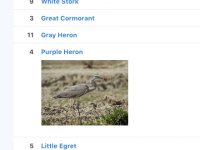TomDerutter
Well-known member
After the 'Big' update when HBW was created it was pretty quiet on taxonomic front. At least this is something that should improve, with 'Birds of the world' linked to the ebird/clements taxonomy.
I'm also expecting quite a lot of the whole eco-system they are creating. ebird, merlin, macaulaylibrary, birds of the world... will all influence and improve each other. It feels like it's going to be more dynamic and alive then HBW/IBC ever was...
There's more free info to be found on https://ebird.org or https://www.macaulaylibrary.org/ then there was at IBC.
I'm also expecting quite a lot of the whole eco-system they are creating. ebird, merlin, macaulaylibrary, birds of the world... will all influence and improve each other. It feels like it's going to be more dynamic and alive then HBW/IBC ever was...
There's more free info to be found on https://ebird.org or https://www.macaulaylibrary.org/ then there was at IBC.









